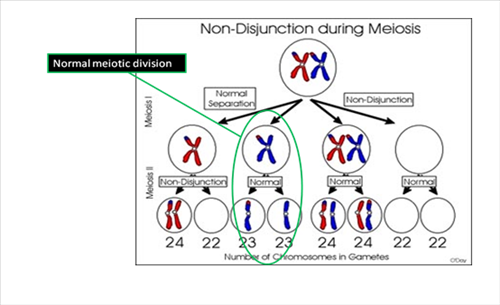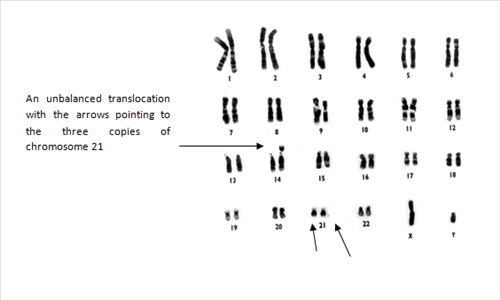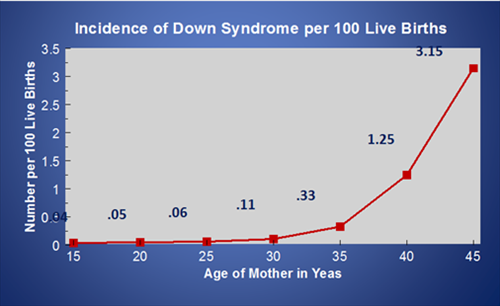Down syndrome (Trisomy 21)
Ayesha Umrigar, PhD; Gabrielle Sheets; Meher Banajee, Ph.D., CCC-SLP; Fern Tsien,
Ph.D.
Down syndrome is one of the most common genetic birth defects, occurring in 1 out
of 691 births (about 6000 births) each year in the United States.
What causes Down syndrome?
Normally, people have two copies of each chromosome-46 total. Patients with Down syndrome
have an extra copy of their 21st chromosome. This extra chromosome is usually acquired before fertilization in meiosis,
which is the process where sperm and egg cells, or gametes, are made.
Errors in cell division: Non-disjunction
In meiosis, a cell divides to produce gametes containing 23 chromosomes. During fertilizations,
the gametes meet to form a fertilized egg containing the normal number of 46 chromosomes.
An error in meiosis (called a non-disjunction event) causes the gamete to have an
extra copy of a chromosome, and the resulting fertilized egg has a total of 47 chromosomes.
Mosaic Down syndrome
It is also possible for a non-disjunction to happen after fertilization (about a 1-2%
chance). In this case, some of the patient's cells are normal and some contain the
extra chromosome. This is called mosaicism. Patients with this type of Down syndrome have milder symptoms.
Translocation Down syndrome
3-4% of the cases of Down syndrome are caused by a translocation. In other words, a chromosome (or part of a chromosome) gets attached to another
chromosome. The resulting fetus has two normal copies of chromosome 21 in addition
to a third copy attached to another chromosome.
In about half of all translocation cases, one of the parents is carrying the rearrangement
of chromosome 21 called a balanced translocation. The parent still has two copies of chromosome 21, but one of the copies may be attached
to another chromosome. Since there is no gain or loss of genetic material, this chromosome
arrangement has no effect on the parent's health. However, this chromosome arrangement
can be passed down to the child resulting iin an unbalanced translocation. In an unbalanced translocation, the child inherits the two chromosomes that are
attached to each other as well as a normal chromosome. Translocation Down syndrome
is the only form of the disorder that can be passed from parents to child. The chance
of passing on the unbalanced translocation depends on the sex of the parent who carries
the rearranged chromosome 21:
If the father is the carrier, the risk is about 3-5 percent.
If the mother is the carrier, the risk is about 12-15 percent.
Down syndrome and the age of the mother
The chance of having a child with Down syndrome increases as the mother gets older.
At age 25, the probability of having a baby with Down syndrome is 1 in 1,250.
At age 30, the probability is 1 in 1,000.
At age 35, the probability is 1 in 400.
At age 40, the probability is 1 in 100.
At age 45, the probability is 1 in 30.
At age 50, the probability is 1 in 10.
Prenatal tests such as chorionic villus sampling or amniocentesis can help to diagnoise the trisomy
with a high degree of certainty in pregnancy.
Parents of a baby with Down syndrome usually have a 1 percent chance of having another
affected baby. However, there is an additional risk based on the mother's age.
What medical conditions do patients with Down syndrome have?
Features in newborns with Down syndrome may include:
- Epicanthal fold (fold of skin covering inner corner of eye)
- Flat facial profile
- Abnormal ears
- Transpalmar crease (a single crease across the palm of the hand)
- Poor muscle tone (also referred to as hypotonia)
Medical conditions found in older children may include:
- Increased risk of heart disease
- Leukemia
- Gastrointestinal problems associated with intestine or esophagus blockages
- Intellectual disability (mild to moderate)
- Hearing loss
- Speech impediments
Helping patients with Down syndrome communicate
Teaching children with Down syndrome to communicate effectively is vital in helping
them become independent and productive individuals. In order to make sure children
with Down syndrome are able to effectively learn communication skills, it is important
to make sure that no physical conditions are impeding the learning process. Hearing
disorders interfere greatly with language development and learning, and 60-80% of
patients with Down syndrome have hearing disorders due to the small external ear canals
associated with the syndrome. Hearing evaluations should be done periodically on young
children with Down syndrome to determine if they need treatment for hearing loss before
speech language intervention is started. Children with Down syndrome benefit from
learning and using sign language to supplement their spoken language skills.
Age recommended hearing evaluations:
- Birth to 6 months: Auditory brainstem response (ABR) test or other objective assessment of hearing
- 6 to 12 months: Provide ABR of hearing if not performed previously or if previous results are suspicious.
- Yearly auditory testing for children 1-3 years old and every two years for children 3-13 years old.
- 12 to 18 years: hearing evaluations every two years.
- Over 18 years: continue auditory testing every two years.
Patients with Down syndrome sometimes have facial structures and poor muscle tone
which can make speech difficult. Cognitive impairments might cause these individuals
to have difficulty in comprehending language, especially spoken words. These impairments
can be addressed and often improved with speech therapy. Children with Down syndrome
are eligible for early-intervention therapy through the Louisiana Early Steps Program.
Down syndrome support groups
National Down Syndrome Society (NDSS)
Click here to find support groups in your area
International Mosaic Down Syndrome Association
Gigi's Playhouse - New Orleans
To schedule an appointment with one of the clinical geneticists at Children's Hospital of New Orleans, contact:
Tasha Hawkins (new patients)
Amy Molina (returning visits)
(504) 896-9254
To find other genetics clinics within Louisiana, click here.
To locate a genetics clinic outside of Louisiana, click here.
To contact the LSUHSC Speech Language Clinic and the Audiology Clinic:
1900 Gravier Street, 9th Floor
New Orleans, LA. 70112-2262
Phone: (504) 568-4348
Fax: (504) 562-4352
References and more information about Down syndrome:
"Facts about Down Syndrome". Centers for Disease Control and Prevention. www.cdc.gov Last update: June 8, 2011
"Down Syndrome". Eunice Kennedy Schriver National Institute of Child Health and Human Development, National Institutes of Health,
http://www.nichd.nih.gov/health/topics/down_syndrome.cfm
